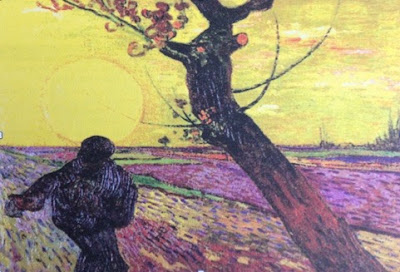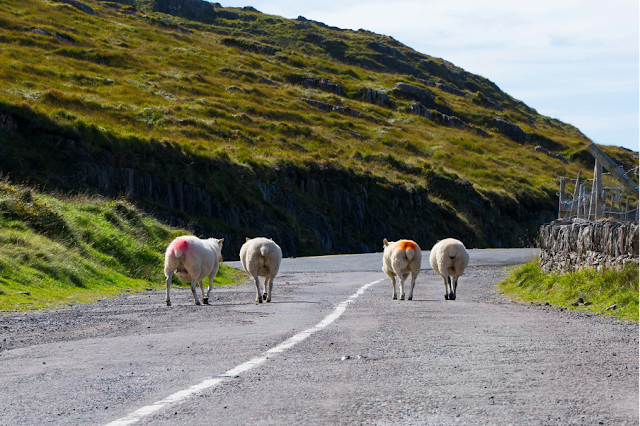Jesus said, “Imagine a sower going out to sow.”
Fifteenth Sunday in Ordinary Time - Reflection on the Gospel
16 July 2017
Jesus said, “Imagine a sower going out to sow.”

Matthew 13:1-23
16 July 2017
Jesus said, “Imagine a sower going out to sow.”

In his Gospel, Matthew gives this parable a title, calling it the Parable of the Sower. However, Matthew has Jesus provide an interpretation of the parable that, like the parable itself, focuses not so much on the sower, as on that which is sown and what happens to it. The attention is on what happens after the sowing, in other words, on the varied outcomes of the sowing and on the varied responses to the revelation of the kingdom. Interesting, then, to discover that in the Greek text, while the sower sows, there is no mention of the word ‘seed.’
To the disciples then, and to us now, this interpretation provides both an explanation as to why the kingdom is not accepted and encouragement to persevere with the assurance that remarkable results will ensue. However, in some ways, interpretation, even one offered by Jesus, deadens the parable and curtails its power to shock or surprise. It has the result that we can neglect to think about, or reflect on, it and are not challenged to do so, so that we fail to read our lives in the parable and read the parable in our lives. It is important for us to move beyond this in order to relate the parable to our lives.
Amy Jill Levine writes that parables are not answers but invitations. Read well, they do not offer banality or platitudes, but will disturb and challenge us to ask questions, to discover what truly matters, and to live as God wants us to live.
So, how does the Parable of the Sower disturb and challenge us today? What questions does it challenge us to ask and what does it ask of us? It is a parable we have heard many times before. How, then, can it be fresh and challenge us anew?
We can feel we know the parables well, yet they are impenetrable and mysterious and always remain so. When we engage with them, we engage with the mystery of God. Walter Wink describes parables as “tiny lumps of coal squeezed into diamonds … that catch the rays of something ultimate and glint it at our lives.” Viewing the familiar parable from a different angle and casting another light on it may allow us to catch a glimpse of that “something ultimate” at its core.
Perhaps, we can look at this parable from the perspective of its title. It may be helpful to focus on the sower who is at work here and to ask questions of the sower.
Who is this sower?
We might decide that the sower is God, or Jesus, sowing the word that is God’s. For Matthew, it is Jesus.
What kind of a sower is he?
How does this sower act?
What can the sower teach us that can help us to live our vocation as Christians, as disciples of the Lord, and as Dominicans who preach the liberating Word of God?
The sower sows generously and lavishly, but also somewhat indiscriminately and with a degree of carelessness which risks much being lost. What is sown lands haphazardly and must try to take root where it has been cast. Not all of it is cast ‘wisely’ or with a view to ensuring successful growth, so that one might wonder whether the sower is at fault here.
However, the sower has just one responsibility: to sow. He does not allow himself be curtailed in carrying out his task, his sole task, by careful strategies aimed at the greatest possible outcome or by anxiety that much of his work will not produce results. Rather, he does what is his to do wholeheartedly, holding nothing back.
So indiscriminate is the sowing that possibility of a harvest seems precarious, yet there is a harvest despite the obstacles, and it is a good harvest: ‘some a hundredfold, some sixty, some thirty.’ Where it falls, it brings forth fruit - there is loss, but also fruit.
The action of this parable takes place at different points in time and from one beginning, there are multiple endings, pointing to a future, a future when God’s kingdom is fully there. For Matthew, the parable is radically about the one who sows: Jesus is the sower and those who follow Jesus are empowered to do as he does. It is about Jesus and about the kingdom, but it is also about our lives. If Jesus’ task is to sow ‘the word of the kingdom’, so too is it ours. Disciples are those who hear Jesus’ word, understand it profoundly with their hearts, accept it, and respond wholeheartedly in following Him. To understand is a key virtue for authentic discipleship and it is something open to all, not restricted to only a few. Disciples will bear fruit to varying degrees according to their ability and capacity.
Our mission contributes to kingdom-building, but we will not always be present when or if it bears fruit, and neither are we needed for that. It is through the power of God that the sowing will bear fruit, wherever and whenever that is. Just as the sower has no control over soil, seeds, or birds, we need not be concerned with the results of our sowing. There is a lesson for us, surely, as individual disciples and as Church, not to be demoralised by apparent lack of success or, even, by failure. We must try not to allow thoughts of failure, rejection, loss, or wasted effort to distract us from what we are called to do. We cannot be so paralysed by fear of failure that, not only do we not risk failing but, we do not risk acting.
We are called to go on sowing ‘the word of the kingdom’ (v. 18) and the Good News of Jesus Christ. It will, some time, somewhere, bear fruit. Where and when and how is not for us to worry about.
In today’s reading, God promises Isaiah, ‘the word that goes from my mouth does not return to me empty, without carrying out my will and succeeding in what it was sent to do.’ As T. S. Eliot puts it: “For us, there is only the trying. The rest is not our business.”
Our business as disciples is to imitate the sower, to sow and sow and sow, unstintingly and without measure, or judgement, or favour. Our mission is to follow the example of the Lord’s generous, indiscriminate sowing, and to keep on doing so. We need to place our trust in the Lord and to trust that, in time, there will be fruit. We must leave that to the Lord. Equally, we must entrust the time of bearing fruit and the harvesting to others whom the Lord will call. That, for now, is not our business.
A sower’s job is to sow, no more and no less.
If we can truly hear and understand this, we can be energised by this parable into a realisation that as disciples, as sowers of the word of God, all we have to do is sow! The rest is up to the Lord.
So, in the coming week, perhaps we might read again the Parable of the Sower and rest with these questions:
What does it teach us of our lives?
What light does it cast on our situation?
What does it call us to do or to be as disciples of Jesus?
Most importantly, how can it be a word of hope, a word of life, a word that is Good News, in today’s world?
If we cannot find a word of hope in our readings of Scriptures, we can have nothing to say to others. Sacred Scripture is the Good News. It is God’s life-giving Word. It is to the sowing of this that we are called. Let us sow!


Comments
Post a Comment
Thank you for reading my writing. I'm interested to hear your thoughts - please share.